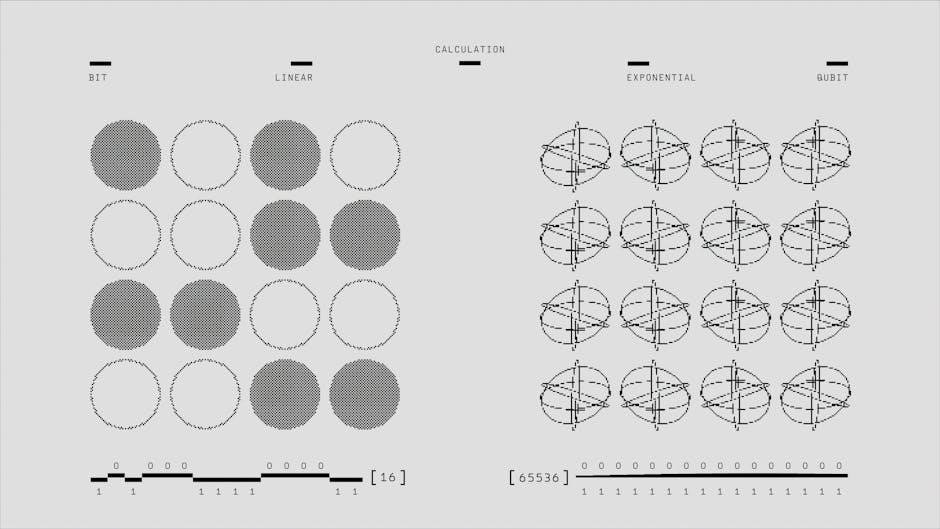Overview of Saxon Math 5/4

Saxon Math 5/4 is a comprehensive math program designed for 4th or 5th-grade students, focusing on incremental development and continuous review of concepts․ It covers decimals, fractions, signed numbers, and problem-solving strategies, emphasizing mastery through practice and repetition;
Saxon Math 5/4 is a skill-level math program designed for students in the 4th or 5th grade, following the completion of Saxon Math 3 or Intermediate 3․ It is structured to help students build a strong foundation in mathematics through a spiral approach, introducing concepts incrementally and reinforcing them with continuous review․ Each lesson is divided into sections: a Warm-Up to refresh previous skills, a New Concept to introduce new material, and guided and independent practice to ensure mastery․ The program emphasizes problem-solving strategies and mental math techniques, encouraging students to think critically and apply mathematical concepts to real-world situations․ Saxon Math 5/4 is known for its clear, step-by-step explanations and its focus on repetition to solidify understanding․ It is designed to be self-paced, allowing students to progress at their own speed while developing confidence and proficiency in math․
Structure of Saxon Math 5/4 Lessons
Saxon Math 5/4 lessons are structured to ensure systematic learning and retention․ Each lesson begins with a Warm-Up, consisting of facts practice and review exercises that reinforce previously learned concepts․ This section helps students maintain fluency and ensures they do not forget earlier material․ Following the Warm-Up, the New Concept portion introduces a new mathematical idea through clear explanations and examples․ This is followed by Guided Practice, where students work through problems alongside the teacher or on their own, applying the newly learned concept․ The lesson concludes with Independent Practice, allowing students to apply what they have learned without assistance․ Additionally, each lesson includes a Problem Set that integrates both new and previously learned concepts, promoting a deeper understanding and the ability to apply math in various contexts․ This structured approach ensures that students build a strong foundation and gradually master more complex skills․

Key Features of Saxon Math 5/4
Saxon Math 5/4 features incremental concept development, continuous review, and a spiral approach․ It covers division with decimals, fractions, and signed numbers, while emphasizing problem-solving skills and mental math strategies to build accuracy and confidence․
Incremental Development of Math Concepts
Saxon Math 5/4 employs an incremental approach, introducing concepts in small, manageable steps․ Each lesson builds on previous knowledge, ensuring a solid foundation․ This method prevents overwhelming students and allows for gradual mastery, fostering confidence and understanding in mathematics․

Continuous Review of Previous Concepts
The program incorporates frequent reviews of earlier material, reinforcing retention and preventing forgetting․ Mixed practice exercises blend new and previously learned topics, ensuring a strong grasp of all concepts․ This spiral approach supports long-term understanding and readiness for advanced math․
Division with Decimals, Fractions, and Signed Numbers
Saxon Math 5/4 provides a thorough exploration of division, encompassing decimals, fractions, mixed numbers, and signed numbers․ Students learn to divide decimals by whole numbers and vice versa, understanding place value relationships․ Fraction division is introduced with visual models and real-world applications, simplifying complex operations․ Mixed numbers are converted to improper fractions for easier calculation․ The curriculum also covers dividing signed numbers, emphasizing the rules for positive and negative results․ Mental division strategies and various notations, such as the division box, sign, and bar, are taught to reinforce understanding․ These lessons are integrated with problem-solving exercises, ensuring students can apply division skills in practical scenarios․ The systematic approach builds confidence and fluency in handling diverse division problems, preparing students for higher-level math․

Benefits of Using Saxon Math 5/4
Saxon Math 5/4 offers numerous benefits, including mastery through repetition and practice, which builds confidence and fluency․ It provides a solid math foundation, enhances problem-solving skills, and prepares students for higher-level math concepts․
Mastery Through Repetition and Practice
Saxon Math 5/4 emphasizes mastery through repetition and practice, ensuring students build a strong foundation in math․ Each lesson introduces new concepts in small increments, followed by regular review of previously learned material․ This spiral approach helps reinforce understanding and prevents knowledge gaps․ The program includes daily practice problems, mixed reviews, and periodic assessments to solidify skills․ By consistently revisiting concepts, students develop fluency and confidence, making complex tasks more manageable․ This method aligns with research showing that spaced repetition enhances long-term retention and mastery, particularly in subjects like mathematics․ The structured approach of Saxon Math 5/4 ensures that students are well-prepared for advanced math studies by fostering a deep understanding of each concept through dedicated practice and review․
Development of Problem-Solving Skills
Saxon Math 5/4 places a strong emphasis on developing problem-solving skills through structured lessons and practical applications․ Each lesson includes a Warm-Up section that introduces strategies for tackling complex problems, helping students think critically and logically․ The program incorporates mental math techniques, encouraging students to approach problems from multiple angles․ By breaking down problems into manageable steps, Saxon Math 5/4 fosters a systematic approach to problem-solving․ This method not only improves mathematical proficiency but also enhances analytical thinking and creativity․ The consistent exposure to various problem types prepares students to apply their skills in real-world scenarios, making math more relevant and engaging․ Over time, students develop confidence in their ability to solve challenging problems, which is a cornerstone of mathematical literacy and lifelong learning․



